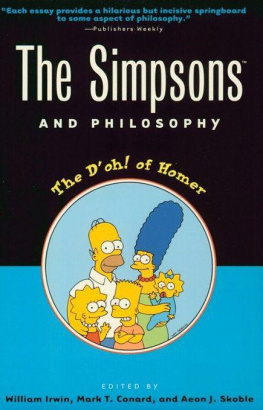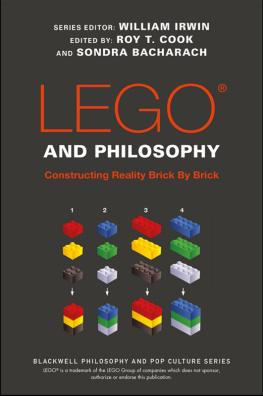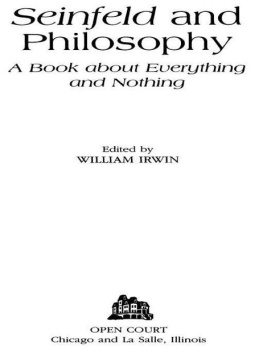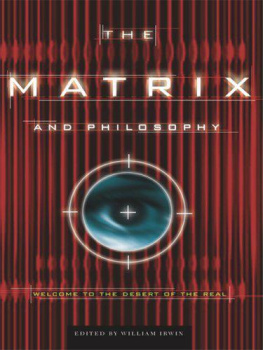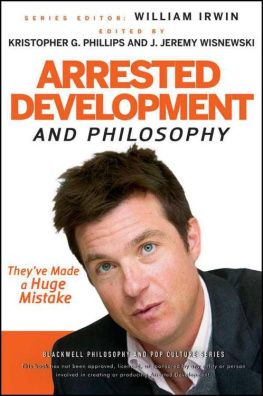William Irwin - The Simpsons and Philosophy: The Doh! of Homer
Here you can read online William Irwin - The Simpsons and Philosophy: The Doh! of Homer full text of the book (entire story) in english for free. Download pdf and epub, get meaning, cover and reviews about this ebook. year: 2001, publisher: Open Court, genre: Children. Description of the work, (preface) as well as reviews are available. Best literature library LitArk.com created for fans of good reading and offers a wide selection of genres:
Romance novel
Science fiction
Adventure
Detective
Science
History
Home and family
Prose
Art
Politics
Computer
Non-fiction
Religion
Business
Children
Humor
Choose a favorite category and find really read worthwhile books. Enjoy immersion in the world of imagination, feel the emotions of the characters or learn something new for yourself, make an fascinating discovery.
- Book:The Simpsons and Philosophy: The Doh! of Homer
- Author:
- Publisher:Open Court
- Genre:
- Year:2001
- Rating:3 / 5
- Favourites:Add to favourites
- Your mark:
- 60
- 1
- 2
- 3
- 4
- 5
The Simpsons and Philosophy: The Doh! of Homer: summary, description and annotation
We offer to read an annotation, description, summary or preface (depends on what the author of the book "The Simpsons and Philosophy: The Doh! of Homer" wrote himself). If you haven't found the necessary information about the book — write in the comments, we will try to find it.
The Simpsons and Philosophy: The Doh! of Homer — read online for free the complete book (whole text) full work
Below is the text of the book, divided by pages. System saving the place of the last page read, allows you to conveniently read the book "The Simpsons and Philosophy: The Doh! of Homer" online for free, without having to search again every time where you left off. Put a bookmark, and you can go to the page where you finished reading at any time.
Font size:
Interval:
Bookmark:

I recommend it to everyone, whether already a Simpsons fan or not. Youll be surprised at what wisdom lurks in these pages.
T OM M ORRIS , author of If Aristotle Ran General Motors
Fans of The Simpsons are certain to find this book to be the perfect rebuttal for those who dismiss the show as a no-brainer.
P UBLISHERS W EEKLY
Not only is The Simpsons and Philosophy highly educational, it enhances the viewing and re-viewing of the Simpsons episodes, and sheds a new light on the series.
P ROFESSOR P ER B ROMAN , Butler University, Indianapolis
The Simpsons and Philosophy is a great place to begin any program in Simpsons studies. A serious look at a funny subject.
M ARK I. P INSKY , author of The Gospel According to The Simpsons
The Simpsons and Philosophy is a terrific book. Philosophers and non-philosophers come together to show that some very interesting philosophical issues arise from the characters, the thoughts, and the plots of The Simpsons . The essays are well written, many times provocative, reflective, intelligent without being elitist and, perhaps most valuable, a lot of fun to read. Not a Simpsons love-fest by any stretch (for example, could Bart be a Nietzschean hero or Heideggerian thinker?), this book is serious philosophy applied to a sometimes serious (and seriously funny) television show.
There are also papers devoted to more literary sorts of concerns, such as parody, allusion, and irony, with attempts to show how The Simpsons can be compared with other forms of art, such as cinema. There are some splendid comparisons of The Simpsons with numerous other television series, for instance Seinfeld, Leave It to Beaver, The Jack Benny Show , and MASH , as well as films such as Psycho, Pulp Fiction, Goodfellas , and The Picture of Dorian Gray .
I recommend this book to anyone whos ever been caught off guard by an example of Homer being logically challenged, or Bart pulling a dirty trick, or a poignant remark by Lisa. I recommend this book to anyone interested in using a provocative, and sometimes challenging text in an Introduction to Philosophy class.
You can learn from this book (now hear Homers and Barts voices echoing), but you dont have to if you dont want to.
P ROFESSOR M ICHAEL F. G OODMAN, Humboldt State University
The Simpsons and Philosophy
Popular Culture and Philosophy
General Editor: William Irwin
V OLUME 1
Seinfeld and Philosophy: A Book about Everything and Nothing (2000) Edited by William Irwin
V OLUME 2
The Simpsons and Philosophy: The Doh! of Homer (2001) Edited by William Irwin, Mark T. Conard, and Aeon J. Skoble
V OLUME 3
The Matrix and Philosophy (2002) Edited by William Irwin
The Simpsons and Philosophy
The Doh! of Homer
Edited by
WILLIAM IRWIN, MARK T. CONARD, and AEON J. SKOBLE

OPEN COURT
Chicago and La Salle, Illinois
Dedicated to Lionel Hutz and Troy McClure
(whom you might remember from such TV shows as The Simpsons )
Contents
RAJA HALWANI
AEON J. SKOBLE
ERIC BRONSON
GERALD J. ERION and JOSEPH A. ZECCARDI
MARK T. CONARD
WILLIAM IRWIN and J.R. LOMBARDO
DEBORAH KNIGHT
CARL MATHESON
DALE E. SNOW and JAMES J. SNOW
JAMES LAWLER
PAUL A. CANTOR
JASON HOLT
DANIEL BARWICK
DAVID VESSEY
JENNIFER L. MCMAHON
JAMES M. WALLACE
DAVID L. G. ARNOLD
KELLY DEAN JOLLEY
Acknowledgments
The writing, editing, and other miscellaneous tasks involved in producing The Simpsons and Philosophy amounted to a fun and stimulating experience. We would like to thank the contributors for keeping both a sense of professionalism and a sense of humor throughout the project. We would sincerely like to thank the good folks at Open Court, particularly David Ramsay Steele and Jennifer Asmuth for their advice and assistance. And, last but not least, we would like to thank our friends, colleagues, and students with whom we discussed The Simpsons and philosophy, who helped make the work possible, and who offered valuable feedback on the work in progress. A list such as this is almost inevitably incomplete, but among those to whom we are indebted are: Trisha Allen, Lisa Bahnemann, Anthony Hartle, Megan Lloyd, Jennifer ONeill, and Peter Stromberg.
Introduction: Meditations on Springfield?
How many philosophers does it take to write a book about The Simpsons ? Apparently, about 20 to write it and 3 to edit. But thats not so bad, considering it takes 300 people 8 months, at a cost of 1.5 million dollars, to make a single episode of The Simpsons . Seriously, though, dont we have other work to do besides writing about TV shows? The short answer is yes, we do, but we enjoyed writing these essays, and we hope youll enjoy reading them.
The seeds for this volume were sown a few years ago. When the popular comedy Seinfeld was going off the air, William Irwin had a quirky ideaa collection of philosophical essays on the show about nothing. He and his philosopher pals enjoyed the show and engaged in many humorous and stimulating discussions about it, so why not share the fun in the form of a book? The people at Open Court had the vision, fortitude, and sense of humor to take on the project, and so Irwin found himself editing Seinfeld and Philosophy: A Book about Everything and Nothing . The book was a true success, not only among academics, but among the general public as well.
Another television show Irwin and his friends enjoyed and had discussed is The Simpsons. They appreciated its irony, its irreverence, and they realized thatlike Seinfeld it was a rich and fertile ground for philosophical investigation and discussion. So Irwin decided to put together a second volume, this one on The Simpsons , and he asked two of the contributors to the Seinfeld book, Mark Conard and Aeon Skoble, to co-edit the work. Once again, Open Court applauded the idea, and if youre reading this, youre obviously at least a little interested in either philosophy, The Simpsons , or both. The concept is the same: the show has enough intelligence and depth to warrant some philosophical discussion, and as a popular show, can also serve as a vehicle for exploring a variety of philosophical issues for a general audience.
The Simpsons is rich in satire. Without question it is one of the most intelligent and literate comedies on television today. (We know thats not saying much, but still...) It may seem incongruous to those who have dismissed it as a mere cartoon about an oaf and his family (and weve seen plenty of those) to say that the show is intelligent and literate, but attentive viewing reveals levels of comedy far beyond farce. We see layer upon layer of satire, double meanings, allusions to high as well as popular culture, sight gags, parody, and self-referential humor. In response to Homers criticism of a cartoon that his kids are watching, Lisa replies, If cartoons were meant for adults, theyd be on in prime time! Despite Lisas words, The Simpsons is clearly for adults, and its superficial to dismiss the show merely because it is popular and animated.
Matt Groening studied philosophy in college, but none of the contributors to this book believes there is a deep underlying philosophy to Groenings cartoon. This is not the philosophy of The Simpsons or The Simpsons as philosophy; its The Simpsons and Philosophy . Were not attempting to convey the intended meaning of Groening and the legion of writers and artists who work on the show. Rather, were highlighting the philosophical significance of The Simpsons as we see it. Some of the essays in this book are the reflections of academics on a show they like and which they think says something about an aspect of philosophy. For example, Daniel Barwick looks to the miserly curmudgeon, Mr. Burns, to determine if we can learn something about the nature of happiness from Burnss unhappiness. Others explore the thought of a philosopher by making use of one of the characters. For instance, Mark Conard raises the question, Can Nietzsches rejection of traditional morality justify Barts bad behavior? Still others use the show as a vehicle for developing philosophical themes in a way that is accessible to the non-specialist (an intelligent person who has some interest in philosophical reflection but who doesnt make a living at it). For example, Jason Holt explores Springfield Hypocrisy to determine whether hypocrisy is always unethical.
Next pageFont size:
Interval:
Bookmark:
Similar books «The Simpsons and Philosophy: The Doh! of Homer»
Look at similar books to The Simpsons and Philosophy: The Doh! of Homer. We have selected literature similar in name and meaning in the hope of providing readers with more options to find new, interesting, not yet read works.
Discussion, reviews of the book The Simpsons and Philosophy: The Doh! of Homer and just readers' own opinions. Leave your comments, write what you think about the work, its meaning or the main characters. Specify what exactly you liked and what you didn't like, and why you think so.

